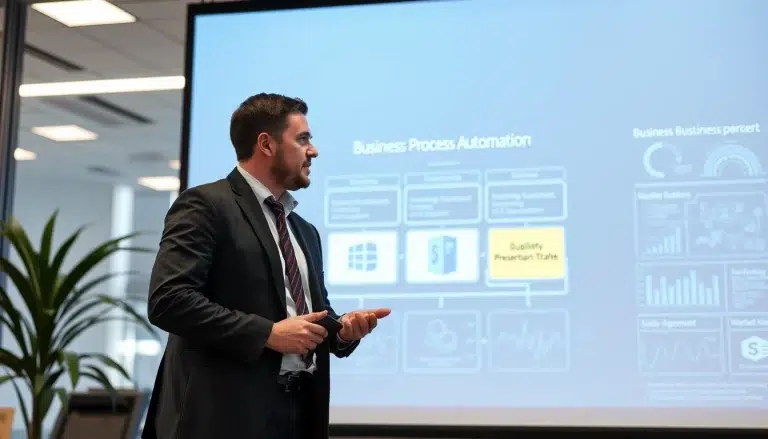Business Process Automation Training Course

| Date | Format | Duration | Fees (USD) | Register |
|---|---|---|---|---|
| 17 Nov - 25 Nov, 2025 | Live Online | 7 Days | $4415 | Register → |
| 30 Nov - 04 Dec, 2025 | Live Online | 5 Days | $3350 | Register → |
| 14 Dec - 18 Dec, 2025 | Live Online | 5 Days | $3350 | Register → |
| Date | Venue | Duration | Fees (USD) | Register |
|---|---|---|---|---|
| 24 Nov - 28 Nov, 2025 | Istanbul | 5 Days | $5905 | Register → |
| 31 Dec - 02 Jan, 2026 | Lisbon | 3 Days | $4945 | Register → |
Did you know that the main goal of Business Process Automation (BPA) is to improve a business’s workflow by reducing costs, time, and effort while boosting productivity, minimizing mistakes, and controlling processes in real time?
Course Overview
The Business Process Automation Training Course by Alpha Learning Centre is meticulously designed to equip professionals with essential skills in business process automation principles, methodologies, and implementation. This course focuses on how professionals can effectively identify, analyse, and automate business processes to enhance organisational efficiency and drive continuous improvement.
Why Select This Training Course?
Selecting this Business Process Automation Course offers numerous advantages for professionals involved in process improvement and operational excellence. Participants will gain advanced knowledge of automation strategies, tools, and implementation methodologies. The course provides hands-on experience with industry-standard automation platforms and real-world case studies, enabling attendees to optimise their process automation strategies effectively.
For organisations, investing in this training enhances overall operational efficiency and ensures better process management. Research shows that organisations implementing comprehensive business process automation frameworks can achieve enhanced accuracy and consistency by ensuring tasks are performed consistently and accurately every time and better data quality through accurate data capture during process execution.
For individuals who complete this course will benefit from enhanced career prospects as they become more valuable assets in their respective fields. Studies indicate that professionals with business process automation expertise can significantly improve their career trajectory as the field requires understanding of workflow automation using tools like RPA, AI, and low-code platforms, while skills in process discovery, mapping, and optimisation are essential for identifying automation opportunities.
Transform your process automation capabilities – Register now for this critical advanced training programme!
Who is this Training Course for?
This course is ideal for:
- Business Analysts
- Operations Managers
- IT Professionals
- Process Improvement Specialists
- Project Managers
- Organisational Development Consultants
What are the Training Goals?
The objectives of this training course are to enable professionals to:
- Understand the basics and advantages of business process automation.
- Identify and Analyse processes suitable for automation within their organisations.
- Learn to select and implement appropriate automation tools and technologies.
- Apply best practices in managing and scaling automated processes.
- Design strategies that can help in overcoming the challenges of the automation process.
How will this Training Course be Presented?
The Business Process Automation Training Course delivers comprehensive, hands-on training through proven methodologies designed to maximise learning outcomes and practical skill development. Our expert instructors employ the following methods:
- Workshops: Application of proposed automation concepts through interactive sessions, using case scenarios of real life
- Case Study Analysis: Assess practical, real-life case studies to understand real-life applications and the benefits of automation
- Group Discussions: Participate in group discussions to share your opinions and experiences
- Expert Lectures: Industry-recognized professionals with vast experience in the domain of business process automation will present their knowledge
Each delivery method is carefully integrated to ensure participants gain both theoretical knowledge and practical experience. The course structure promotes active engagement and real-world application, allowing participants to develop crucial analytical and strategic skills within a supportive learning environment.
Join us to experience this dynamic and effective learning approach – Register now to secure your place!
Course Syllabus
Module 1: Automation Strategy and Vision
- Aligning automation with business objectives.
- Identifying automation opportunities across the enterprise.
- Process discovery for automation potential.
- Setting automation goals and KPIs.
- Automation maturity assessment.
- Strategic roadmap for automation implementation.
- Automation governance and compliance.
- Change management for automation initiatives.
- ROI calculation for automation projects.
- Ethics and responsibility in automation.
- Cultural readiness for automation adoption.
- Future-proofing with automation.
Module 2: Process Mapping for Automation
- Detailed process analysis for automation.
- BPMN for automation design.
- Process decomposition for automation layers.
- Identifying automation breakpoints.
- Mapping human vs. automated tasks.
- Process variability and exception handling.
- Decision modelling for automation logic.
- Process metrics before and after automation.
- Workflow design for optimal automation.
- Automation in multi-department workflows.
Module 3: Automation Tools and Technologies
- Selection criteria for automation software.
- Robotic Process Automation (RPA) platforms.
- AI and machine learning in automation.
- Integration of IoT for process control.
- Low-code/no-code automation platforms.
- Automation with cloud-based services.
- API-driven process automation.
- Blockchain for secure automation processes.
- Cybersecurity in automated systems.
- Data management for automation.
- Automation scalability and performance.
Module 4: Automation Implementation
- Automation project lifecycle management.
- Agile methodologies in automation deployment.
- Automation testing strategies.
- Deployment and migration considerations.
- User training for automated systems.
- Monitoring and managing automated processes.
- Error handling and troubleshooting in automation.
- Version control for automation scripts.
- Customisation vs. out-of-the-box solutions.
- Legacy system integration.
- Ensuring data integrity in automation.
- Automation in regulatory compliance.
- Continuous improvement of automated processes.
Module 5: Automation and Workforce Dynamics
- Upskilling for an automated environment.
- Redefining job roles with automation.
- Human-robot collaboration strategies.
- Impact of automation on job satisfaction.
- Automation’s role in employee retention.
- Change management for workforce adaptation.
- Training programs for automation adoption.
- Ethical considerations in workforce automation.
- Measuring productivity with automation.
- Automation’s effect on organisational culture.
Module 6: Measuring Automation Success
- Defining success metrics for automation.
- Pre and post-automation performance analysis.
- Data-driven insights from automation.
- Real-time analytics for automation efficiency.
- Customer experience metrics post-automation.
- Cost-benefit analysis of automation projects.
- Benchmarking automation against industry standards.
- Long-term value of automation investments.
- Adjusting strategies based on automation feedback.
- Reporting on automation outcomes to stakeholders.
Module 7: Automation in Complex Environments
- Managing automation in global operations.
- Automation in regulated industries.
- Handling complex data workflows.
- Automation across different time zones.
- Multilingual automation considerations.
- Automation in supply chain complexity.
- Crisis management with automated systems.
- Automation in high-risk environments.
- Automation for disaster recovery scenarios.
Module 8: Future of Automation
- Emerging trends in automation technology.
- Quantum computing’s potential in automation.
- Automation and the Internet of Things convergence.
- Preparing for AI-driven automation evolution.
- Ethical automation and AI governance.
- Automation in a circular economy.
- The role of automation in sustainability.
Module 9: Automation Security and Compliance
- Security frameworks for automated systems.
- Data protection in automation processes.
- Compliance with global data privacy laws.
- Risk management in automation.
- Audit trails in automated environments.
- Protecting intellectual property in automation.
- Automation recovery and business continuity.
- Insider threats in automated systems.
- Ethical hacking for automation security.
Module 10: Innovation through Automation
- Fostering innovation with automation tools.
- Automation as a catalyst for business model innovation.
- Creating new business opportunities via automation.
- Automation in product and service development.
- Leveraging automation for R&D.
- Automation in creative industries.
- The future of work with automation innovation.
Training Impact
The impact of business process automation training is evident through various real-world case studies and data, which demonstrate the effectiveness of structured programmes in enhancing operational efficiency and process management.
Research indicates that professionals with strong business process automation skills can design and implement new processes that automate a series of tasks, including approval processes, data transfer between systems, document generation, and communications, apply automation to streamline and optimize processes, often involving multiple systems and human interactions, and integrate automation solutions with enterprise systems like ERP, CRM, and other specialized business software.
These case studies highlight the tangible benefits of implementing advanced business process automation techniques:
- Improved operational efficiency through streamlined workflows
- Enhanced accuracy and consistency in process execution
- Increased data quality through automated capture
- Strengthened ability to manage organisational change
By investing in this advanced training, organisations can expect to see:
- Significant improvement in process efficiency and effectiveness
- Improved ability to handle complex automation challenges
- Enhanced decision-making capabilities through automated processes
- Increased competitiveness through comprehensive automation strategies
Transform your career and organisational performance – Enrol now to master Business Process Automation!








